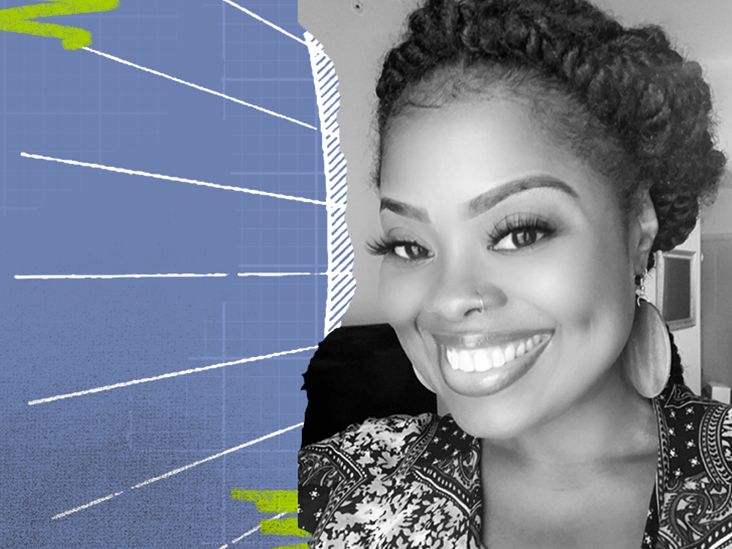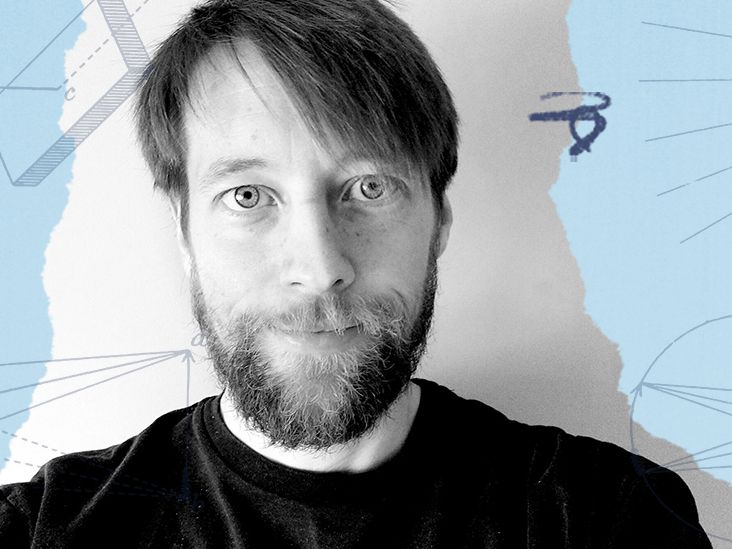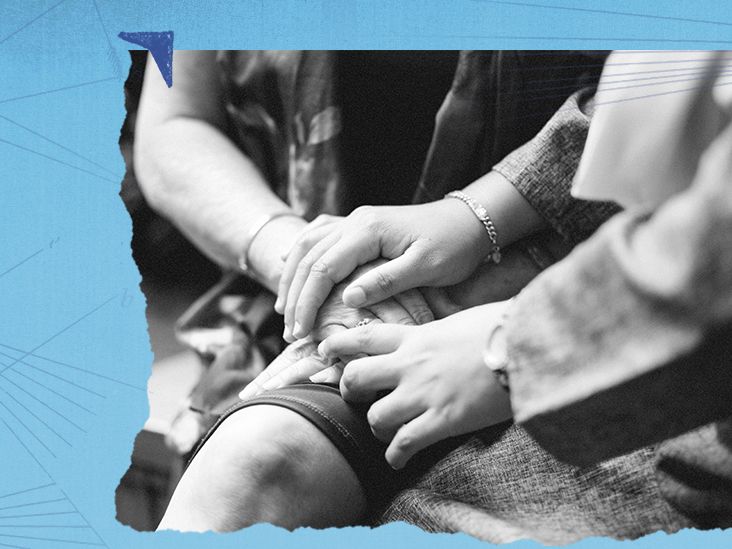
However, realistically, it was impossible to ignore the drastic weight loss, oral thrush, rosacea, and other symptoms.
I parked and went in. Almost immediately, a young male doctor called me in. I am a dispensing optician and ran a shop — today, I would work alone. I couldn’t wait for the “all clear.”
It didn’t come. He gave me the news that I had late stage symptomatic HIV.
Everything went into a dreamlike slow-motion state. I heard phrases like “immediate treatment” and “medication.” He gave me an appointment card and offered his sympathy, finally adding that I had to be at the appointment because, at this stage, the chances of my survival were around 40%.
I got back into the car and drove to work, tears streaming down my face. I was dying.
By mid-morning, I had to call the head office and feign a family emergency. I called a friend, C., and drove to her house.
I broke down completely. My friend was so calm and level-headed, batting away my outbursts of impending death, my feelings of being dirty, and of course, “poor me.” Her children were soon to be home from school.
I called my closest friend D., telling him I needed to see him. I was 45 and had known D. since I had just turned 19. At one time, he had been my lover. He was now my friend and my family.
That night, he was all I needed him to be: calm, quietly listening, and letting me give vent.
I went home to my new flat in Islington. I had come back home to England after 15 successful years in America. I had a new job, all was good. Until today.
During the 80s, I had watched my friends become sick, skeletal, and then die. These were all handsome, young, funny men.
The first weeks of living with the disease were awful. I became sicker and sicker, more and more exhausted. I had to tell my boss that I was probably going to die. He was wonderful. He told me to go home and take care of my life. He paid my full salary for 3 months.
The battery of hospital appointments was daunting. Walking was absolutely exhausting. The new combination drug therapy — AZT, plus a protease inhibitor, which was the medical breakthrough at the time — was hard to swallow. I had to take them religiously.
My white cell count was almost nonexistent, and I was prone to any infection. The pill made me sick. I had to learn to keep everything down until the pills had digested, which was easier said than done.
There were support workers who miraculously sped me through the benefits system. I soon had payment for basic living and interest payments on my mortgage. I sold my car, as I now had a free travel pass on tubes, buses, and local trains, with the letter D for ‘disabled’ and E for ‘elderly’ on the front.
I suddenly found walking in a straight line impossible and could only turn to the left. St. Mary’s hospital sent me for a battery of neurological tests to check whether the virus had crossed the spinal column into my brain. Mercifully, it hadn’t.
By late summer, I began to believe I might survive, yet the side effects of the pills were many and awful: drenching night sweats, the need to be sick, and I could never be a minute away from the toilet.
I saw D. regularly, who lives 5 minutes away from the hospital. Nights were hard for me — I had too much to drink, I felt a lot of self-loathing and self-pity.
I had survived a peculiar and unhappy childhood: unwanted by my birth mother, my grandmother had to illegally sign my birth certificate as “mother.” I was sent to a babies’ home at 11 months old, and then at age 3, I went to a convent boarding school with some fairly sadistic nuns.
My grandmother took me home when I was around 7 or 8 years old. She loved me, and I loved her, but she was hopeless. Finally, at age 11, I was sexually abused by a distant family relative — my godfather!
Now, all of this I had survived, but how was I going to overcome this?
In November 1998, I knew I was very sick. I went into the hospital with pneumocystis pneumonia (PCP). On oxygen, and once again, near the end, my friends came to visit.
D. came every day at first, bringing food as the hospital computer hadn’t added me to the food delivery system.
I spent Christmas with other gay men in the community room, all of us wheeling our oxygen around with us. I needed to get better and get out of there. I didn’t belong!
By March, I was back at home and on the mend. I was still facing all of my problems, but it was time I stopped being self-pitying and drowning myself in booze. I had to find purpose.
I am a trained nursery nurse and had worked with children at risk in inner London daycare centers. I found the number for ChildLine. I applied and was accepted onto the training course as a counselor.
During this time — by now early 1999 — I developed a new side effect called lipodystrophy. This occurs mostly in females and presents either as a fatty hump on the shoulder or, in my case, around the stomach, where all the fat had collected.
This made regular clothes impossible to wear, and it finally got so big it began to affect my breathing. I told the doctor, who I had now come to trust, that, “If this is being ‘well,’ then I don’t want it.” My meds were then changed. I took no more protease inhibitor, and there was no more constant throwing up.
ChildLine became the start of a new journey of self-discovery.
Listening to the dreadful stories and others’ terrible childhoods made my own childhood seem like a bed of roses. I joined the training team and stayed for 6 years. I felt good and worthwhile.
I went to a therapist to talk about everything. She was amazing. My feelings of being ‘dirty’ after the abuse and now with the disease — diminished.
I had survived it all. I had left home at 15 and began my life as a free spirit in London. It was a very exciting time, being young, attractive, and gay in London. I lived in London as a teenager until the age of 19, when I met D. He moved in, and stability reigned. We lived together for 11 years.
But then I got notice of major works on my block. I couldn’t pay, and the benefits wouldn’t pay. I had to sell the flat. I paid off my mortgage and decided that what I wanted was to live in the country. I bought a dump of a house a long way away from London and said goodbye to ChildLine.
I devoted the next couple of years to doing up the house and adding the finishing touches. Then there was the garden — what a joy! It made me happy and content. All my creative juices were flowing. Friends came and admired it.
I was well, the virus was undetectable now, and I was faced with what to do next.
Village life was not for me. An example of this was being invited to a tea once. I went with a friend who was staying with me. At one point, my friend announced to the hosts, “Christopher has really recovered so well from being so ill!” The room fell silent. All eyes were on me. “Ill with what?” I decided I didn’t care about these people. “I have AIDS,” I said. There was a rush to change the subject.
Then came the time to go back to London. It took 3 years, but I made enough to buy a tiny studio flat in Hampton Wick. I started to work as a volunteer in one charity shop and then another one.
At the same time, I developed a horrible cough — day and night. The flat was damp, and the doctor suggested that it could be the cause. D. bought me a dehumidifier, and it was full of water every morning.
It was now 2012. I sold the flat for a really good price.
However, this wouldn’t buy me anywhere in London. D. suggested Brighton. I moved in with him, and my coughing began to stop. We researched Brighton, and eventually, I found a new build in Hove within my price range. It took a long time for the flat to be finished. But in 2016, I moved in. London was only an hour away. I could stay in the London flat as D. was away for 6 months of the year.
It didn’t take me long to realize that walks along the seafront and a daily trip to the supermarket were not going to be enough.
I found Samaritans, applied, and was accepted onto their training course. It was hard, and I didn’t know if I could do it. A year later, I answered my first phone call. Once again, the role made me aware of the many needs of others. I was lucky; I had a home, good friends, and I was well.
Samaritans moved me, and I took to it with passion. I joined the recruitment team, and I became a leader, debriefing Samaritans after their shifts.
In March 2020, D. came home to London, and COVID arrived. Everything stopped. Samaritans closed temporarily. And I received a letter bringing me face-to-face again with my HIV.
The government letter stated that due to my vulnerable medical condition, I had to stay in my flat for 3 months and find a neighbor to take my rubbish out. Food would be delivered.
This was a prison. It was obvious that I would not be able to go back to Samaritans, as the idea of being in a hot room on a phone that many others had used was too risky. So, after 3 years, I left Samaritans.
I cheated; I went for long walks along the deserted streets of Hove. I focused on the gardens I passed, naming as many plants and shrubs as I could. I listened to the birds — anything to stay positive. I spoke to D. twice a day, and many of my other friends were also great, organizing quizzes on Zoom.
My clinic at St. Mary’s hospital had closed down, and I had a bi-annual phone consultation. However, it had been a year since my blood was monitored, which is an important part of aftercare. I got an appointment in London. I got on the empty train, stayed the night with D., we made plans for Christmas, and then I went home. Of course, Christmas would be canceled.
In January this year, while speaking with D. on the phone, I realized he was seriously ill with COVID. I made him call an ambulance and pack a bag. The ambulance arrived very quickly, and he hung up. I had no idea where they would take him. I wasn’t next of kin. It was terrifying. I had no idea if he would survive; he was 84, and at this time, 1,200–1,500 people were being hospitalized.
I finally got a text from him he was In St Mary’s. A relief.
A few days later, he had a stroke, a cranial infarction. He lost some of his sight. He couldn’t use his mobile. In the end, D. was transferred to a stroke unit, then finally to a rehabilitation center. I went up to London to prepare for his homecoming. It was now March.
I spent the next 6 months looking after him. In September, I came home to Hove. It had been a long and difficult year. D. wanted to explore his independence and is doing well.
Now, once again, I am facing my future. A friend at Samaritans suggested Victim Support. I have applied and been accepted onto the training course as a volunteer caseworker. I start next week.
In closing this somewhat abstracted essay, I would say that living with and living through HIV over nearly 25 years has made me completely re-evaluate my whole life. It has made me re-evaluate my many shortcomings, my sense of everything being black or white, and an impatience I used to have with myself.
I have learned to cope with things when I thought I couldn’t. I have new wisdom. I see other people’s needs.
In the end, in an extraordinary reversal, I can honestly and sincerely thank the virus for making me who I am today.


